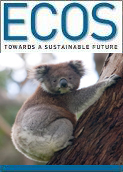
|
Published: 22 April 2013
WA soil carbon study to test greenhouse nitrogen gas risk
A study based in the WA wheat belt is investigating whether increasing soil carbon in grain production to offset greenhouse gas emissions may also increase nitrous oxide emissions, which are nearly 300 times more damaging than carbon dioxide.

|
|
How will increasing soil carbon affect the carbon footprint of wheat? Credit: CSIRO
|
University of Western Australia researchers will examine whether there is a risk that increasing soil carbon will also increase soil nitrous oxide emissions and burden famers with additional nitrogen fertiliser requirements for cropping soils.
‘Increasing carbon in soil is promoted as a means of off-setting greenhouse emissions from grain production,’ said Associate Professor Louise Barton, from the UWA.
‘However we need to check that this benefit is not negated by increased soil nitrous oxide emissions or additional nitrogen fertiliser requirements.
‘Nitrous oxide is a particularly potent greenhouse gas as it is almost 300 times more damaging than carbon dioxide, so it is crucial that we ensure emissions of this gas from agricultural soils are minimised. Further, nitrogen released from the soil into the atmosphere represents a loss of N fertiliser available to crops.’
The three-year study has been established at Buntine – about 250 km northwest of Perth – where the Liebe Grower Group has successfully increased soil carbon as part of a previous research project that commenced in 2003.
Nitrous oxide emissions will be measured at the Liebe Group's Long Term Soil Biology Trial using an automated chamber system. At the same time, crop responses to nitrogen fertiliser will be measured in experimental plots of contrasting soil carbon, and then compared with data from other sites in the WA grain belt.
The project is funded by the Commonwealth Government's ‘Filling the Research Gap' project, which forms part of its Carbon Farming Futures Program, in partnership with the Grains Research Development Corporation (GRDC), the Department of Agriculture & Food WA (DAFWA), and the Liebe Grower Group.
Results from the study will be used inform growers and policy on the effects of increasing soil carbon on the carbon-foot print of grain production in Western Australia.
Source: UWA



